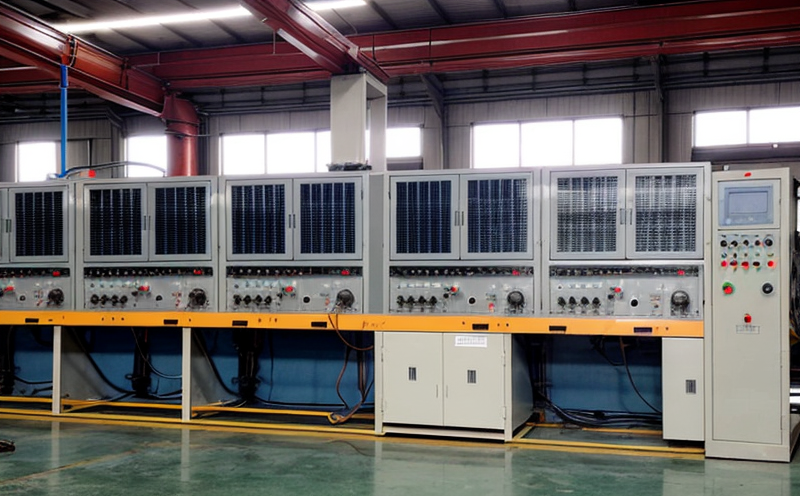
-
Industrial Equipment Certification-
Automation and Control Systems Certification-
Testing for Industrial Control Panels
We provide comprehensive solutions designed to help our clients mitigate risks, enhance performance, and excel in key areas such as quality, health & safety, environmental sustainability, and social responsibility.
Discover
For many years, our organization has been operating successfully, boasting modern laboratories that meet international standards. These laboratories are equipped with the latest technology devices and equipment, and we have built a strong team of experienced and trained personnel to operate them.
DiscoverWelcome to Eurolab, your partner in pioneering solutions that encompass every facet of life. We are committed to delivering comprehensive Assurance, Testing, Inspection, and Certification services, empowering our global clientele with the ultimate confidence in their products and processes.
Discover
-
Industrial Equipment Certification-
Automation and Control Systems Certification-
Testing for Industrial Control PanelsTesting for Industrial Control Panels: Ensuring Safety and Efficiency
Industrial control panels are a crucial component of modern industrial facilities, controlling and regulating various systems such as temperature, pressure, flow rate, and more. However, with the increasing complexity of these systems, ensuring their reliability and safety has become a significant concern. Testing for industrial control panels is essential to prevent accidents, downtime, and costly repairs.
What is Testing for Industrial Control Panels?
Testing for industrial control panels involves evaluating the performance and functionality of these control panels to ensure they operate as intended. This includes testing electrical connections, wiring, circuit breakers, relays, sensors, actuators, and other components. The primary goal of testing is to identify potential issues before they cause a problem, thereby reducing downtime and minimizing risks.
Types of Testing for Industrial Control Panels
There are several types of testing that can be performed on industrial control panels:
Testing ensures safety by identifying potential issues before they cause a problem.
It minimizes downtime and reduces costly repairs.
2. What types of testing can be performed on industrial control panels?
Visual inspection, electrical testing, functional testing, and more.
3. Why is it essential to disconnect power before starting any testing?
To prevent accidents and electrical shock.
4. How often should industrial control panels be tested?
Regularly, ideally every 6-12 months or after significant changes.
5. What are some common issues that can arise during testing?
Loose connections, faulty circuit breakers and relays, sensor and actuator issues.
6. Who is responsible for performing the testing?
Typically, a trained technician or engineer with experience in industrial control systems.
Conclusion
Testing for industrial control panels is an essential process to ensure their reliability, safety, and efficiency. By following the steps outlined above and being aware of common issues, you can prevent accidents, downtime, and costly repairs. Regular testing will help extend the lifespan of your equipment and maintain a safe working environment.

Renewable Energy Testing and Standards
Renewable Energy Testing and Standards: Ensuring a Sustainable Future The world is rapidly transiti...

Automotive Compliance and Certification
Automotive Compliance and Certification: Ensuring Safety and Efficiency The automotive industry is ...

Railway Industry Compliance
Railway Industry Compliance: Ensuring Safety and Efficiency The railway industry is a critical comp...

Chemical Safety and Certification
Chemical safety and certification are critical in ensuring the safe management of products and proce...

Industrial Equipment Certification
Industrial equipment certification is a critical process that ensures industrial equipment meets spe...

Electromechanical Safety Certification
Electromechanical Safety Certification: Ensuring Compliance and Protecting Lives In todays intercon...

Healthcare and Medical Devices
The Evolution of Healthcare and Medical Devices: Trends, Innovations, and Challenges The healthcare...

Cosmetic Product Testing
The Complex World of Cosmetic Product Testing The cosmetics industry is a multi-billion-dollar ma...

NEBS and Telecommunication Standards
Network Equipment Building System (NEBS) and Telecommunication Standards The Network Equipment Bu...

Environmental Simulation Testing
Environmental Simulation Testing: A Comprehensive Guide In todays world, where technology is rapidl...

Pressure Vessels and Installations Testing
Pressure Vessels and Installations Testing Pressure vessels are a critical component of various ind...

Lighting and Optical Device Testing
Lighting and Optical Device Testing: Ensuring Performance and Safety Lighting and optical devices a...

Battery Testing and Safety
Battery Testing and Safety: A Comprehensive Guide As technology continues to advance, battery-power...

Pharmaceutical Compliance
Pharmaceutical compliance refers to the adherence of pharmaceutical companies and organizations to l...

Transportation and Logistics Certification
Transportation and Logistics Certification: A Comprehensive Guide The transportation and logistics ...

Aviation and Aerospace Testing
Aviation and Aerospace Testing: Ensuring Safety and Efficiency The aviation and aerospace industr...

Product and Retail Standards
Product and Retail Standards: Ensuring Quality and Safety for Consumers In todays competitive marke...

Trade and Government Regulations
Trade and government regulations play a vital role in shaping the global economy. These regulations ...

Construction and Engineering Compliance
Construction and Engineering Compliance: Ensuring Safety, Quality, and Regulatory Adherence In the ...

Military Equipment Standards
Military Equipment Standards: Ensuring Effectiveness and Safety The use of military equipment is a ...

Consumer Product Safety
Consumer Product Safety: Protecting Consumers from Harmful Products As a consumer, you have the rig...

Environmental Impact Assessment
Environmental Impact Assessment: A Comprehensive Guide Environmental Impact Assessment (EIA) is a c...

Food Safety and Testing
Food Safety and Testing: Ensuring the Quality of Our Food As consumers, we expect our food to be sa...

Energy and Sustainability Standards
In today’s rapidly evolving world, businesses face increasing pressure to meet global energy a...

Hospitality and Tourism Certification
Hospitality and Tourism Certification: Unlocking Opportunities in the Industry The hospitality and ...

IT and Data Center Certification
IT and Data Center Certification: Understanding the Importance and Benefits The field of Informatio...

Fire Safety and Prevention Standards
Fire Safety and Prevention Standards: Protecting Lives and Property Fire safety and prevention stan...

MDR Testing and Compliance
MDR Testing and Compliance: A Comprehensive Guide The Medical Device Regulation (MDR) is a comprehe...

Electrical and Electromagnetic Testing
Electrical and Electromagnetic Testing: A Comprehensive Guide Introduction Electrical and electrom...

Agricultural Equipment Certification
Agricultural equipment certification is a process that ensures agricultural machinery meets specific...